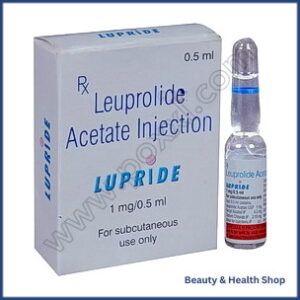ADDICTION
ALCOHOL DEPENDENCE
QUIT SMOKING
ALLERGY
ANTI FUNGAL
FUNGAL INFECTION
FUNGAL NAIL INFECTIONS
ANTI-REJECTION DRUGS
ANTI WORM
ANTIBIOTIC
BACTERIAL INFECTIONS
ARTHRITIS
GOUT
OSTEOARTHRITIS
RHEUMATOID ARTHRITIS
BLOOD
LOW PLATELET COUNT
THROMBOPHLEBITIS
VARICOSE VEINS
COLON
ANAL FISSURE
PILES
ULCERATIVE COLITIS
DIABETES CARE
DIABETES INSIPIDUS
DIABETES TYPE
DIABETIC FOOT ULCERS
GLUCOSE MONITOR
EYES/EAR CARE
DRY EYES
EYE CARE
EYE EXAMINATION
EYE INFECTION
EYE LASHES
EYE PAIN
GLAUCOMA
OCULAR HYPERTENSION
UVEITIS
FEVER CARE
MALARIA
RHEUMATIC FEVER
TYPHOID FEVER
GASTROINTESTINAL
ACIDITY
CONSTIPATION
CROHN'S DISEASE
DIARRHOEA
GALLBLADDER STONES
INTESTINAL ULCERS
IRRITABLE BOWEL SYNDROME
MOTION SICKNESS
NAUSEA
Lupride Depot (Leuprolide Acetate)
Lupride Depot 3.75 mg (Leuprolide Acetate)
| Amount | Price | Price / Unit |
Qty | ||

|
1 Injection | $143.00 | $143.00 |
||

|
2 Injections | $235.00 | $117.50 |
||

|
3 Injections | $313.00 | $104.33 |
Lupride Depot 11.25 mg (Leuprolide Acetate)
| Amount | Price | Price / Unit |
Qty | ||

|
1 Ampoule | $300.00 | $300.00 |
||

|
2 Ampoules | $485.00 | $242.50 |
||

|
3 Ampoules | $704.00 | $234.67 |
Lupride Depot 22.50 mg (Leuprolide Acetate)
| Amount | Price | Price / Unit |
Qty | ||

|
1 Injection | $488.00 | $488.00 |
||

|
2 Injections | $781.00 | $390.50 |
||

|
3 Injections | $1,156.00 | $385.33 |
| Active Ingredient (Generic Name): | Leuprolide Acetate |
|---|---|
| Indication: | Prostate cancer, Endometriosis, Uterine fibroids |
| Manufacturer | Sun Pharmaceutical Industries Ltd |
| Packaging: | 1 injection in one vial |
From: $488.00
Considering Lupride Depot (leuprolide acetate) for advanced prostate cancer, endometriosis, or uterine fibroids? Administered via injection by a healthcare provider, it reduces testosterone and estrogen production, slowing cancer cell progression and inhibiting abnormal tissue growth. It’s a management strategy, not a cure, effectively treating symptoms like painful periods and heavy bleeding to improve quality of life. Understand the benefits, risks, and how it helps manage your condition.
Main Points
- Lupride Depot is prescribed for advanced prostate cancer, endometriosis, and uterine fibroids to slow cancer cell growth and inhibit abnormal tissue development.
- Acting as a GnRH agonist, it reduces testosterone and estrogen production to manage hormone levels in hormone-dependent conditions.
- This medication is administered via injection by a healthcare provider as a management strategy to alleviate symptoms rather than a cure.
- Common side effects of Lupride Depot include hot flashes, headaches, and fatigue, with potential serious complications such as osteoporosis and mood changes.
- It is crucial to consult a doctor about current medications, as interactions may occur with antidiabetic drugs, blood thinners, and other medications.
What Is Lupride Depot Used For?
Lupride Depot is primarily indicated for the treatment of advanced prostate cancer in men who have not responded to previous therapies. If other treatments have proven ineffective, your healthcare provider may prescribe Lupride Depot to slow the progression of cancer cells and improve the chances of recovery.
Typically administered as an injection by a healthcare professional, Lupride Depot works by reducing testosterone production, a hormone that can fuel the growth of cancer cells. By lowering testosterone levels, this medication can help shrink the tumor and alleviate symptoms associated with advanced prostate cancer.
It is important to understand that Lupride Depot is not a cure for prostate cancer but rather a management strategy for the condition. Your doctor will monitor your progress closely and adjust your treatment regimen as necessary. Expect regular check-ups and blood tests to ensure the medication’s effectiveness and safety throughout your treatment journey.
How Does Lupride Depot Work?
Understanding Lupride Depot involves recognizing its role as a gonadotropin-releasing hormone (GnRH) agonist, which influences hormonal balance. By imitating the body’s natural hormone, it decreases testosterone and estrogen production, effectively managing hormone levels. This mechanism allows Lupride Depot to address various conditions by regulating hormone levels.
Mechanism of Action
Lupride Depot decreases the production of gonadotropins, including follicle-stimulating hormone (FSH) and luteinizing hormone (LH), which in turn reduces the production of testosterone in men and estrogen in women. This reduction in sex steroid production slows or halts the growth of cells dependent on these hormones. Initially, Lupride Depot causes a surge in gonadotropin production, leading to a temporary increase in sex steroid levels. However, this surge is quickly followed by a decline in gonadotropins, resulting in decreased sex steroid production. By lowering sex steroid levels, Lupride Depot effectively treats conditions like prostate cancer, endometriosis, and uterine fibroids by inhibiting the growth of hormone-dependent cells, thereby alleviating symptoms and improving health outcomes.
Hormone Regulation
Lupride Depot injection initiates a hormonal response that reduces sex steroid production in the body. This response is controlled by the peptide hormone gonadotropin-releasing hormone (GnRH) produced by the hypothalamus. Lupride Depot, a synthetic form of GnRH, stimulates the release of luteinizing hormone (LH) and follicle-stimulating hormone (FSH) from the pituitary gland. Initially, this causes a temporary increase in sex steroid production. Continued use of Lupride Depot results in the downregulation of GnRH receptors, leading to decreased LH and FSH secretion. Consequently, the levels of sex steroids like testosterone and estrogen are reduced. This reduction in sex steroid levels is how Lupride Depot manages conditions dependent on sex steroid production by altering the body’s hormonal balance.
Treatment Effects
Lupride Depot effectively treats conditions such as prostate cancer, endometriosis, and uterine fibroids by suppressing the production of sex steroids like testosterone and estrogen. By reducing hormone levels, it inhibits the growth and proliferation of cancer cells or abnormal tissue. Patients undergoing treatment may experience improvements in symptoms related to their specific condition. For example, in prostate cancer, lower testosterone levels can slow down cancer cell growth, easing symptoms like urinary retention or bone pain. In women, decreased estrogen levels can limit the growth of uterine fibroids, resulting in lighter menstrual periods and reduced pelvic pain. Similarly, for endometriosis, reduced estrogen levels can help control the growth of endometrial tissue, leading to decreased pelvic pain and inflammation. Lupride Depot‘s regulation of hormone levels makes it an effective treatment for these hormone-dependent conditions.
Prostate Cancer Treatment Options
Prostate cancer treatment options involve a tailored combination of therapies based on factors such as cancer stage, Gleason score, and overall health. Treatment may include active surveillance, surgery, radiation therapy, hormone therapy (like Lupride Depot), and chemotherapy. Active surveillance entails regular monitoring of the cancer, while surgery may involve removing the prostate gland or lymph nodes. Radiation therapy uses high-energy rays to eliminate cancer cells, and hormone therapy aims to lower testosterone levels that promote cancer growth. In advanced cases, chemotherapy may be used to slow tumor growth. Your healthcare team will recommend the most suitable treatment for your individual situation. It’s crucial to discuss the potential benefits and risks of each option with your doctor to make an informed decision and actively manage your prostate cancer.
Endometriosis and Uterine Fibroids
Lupride Depot is commonly prescribed in hormone therapy to manage symptoms of endometriosis and uterine fibroids, prevalent gynecologic conditions affecting numerous women globally. These disorders can cause significant pain, excessive bleeding, and potential infertility, impacting daily life and overall health.
Endometriosis is characterized by the growth of tissue similar to the uterine lining outside the uterus, leading to inflammation, scarring, and adhesions. Uterine fibroids are noncancerous growths in the uterine muscle. Both conditions result in distressing symptoms such as painful periods, heavy bleeding, and pelvic pain.
Lupride Depot functions by lowering estrogen levels, which can help reduce the size of fibroids and alleviate endometriosis symptoms. Through the reduction of estrogen production, Lupride Depot aids in inhibiting the growth of endometrial tissue and uterine fibroids, offering relief from symptoms and enhancing quality of life.
Lupride Depot Dosage and Administration
Understanding the correct dosage and administration of Lupride Depot is essential for safe and effective treatment. It is important to follow the recommended dosage schedule, which typically involves a series of injections at specific intervals. Adhering to these guidelines will help optimize the medication’s benefits while reducing the risk of side effects.
Dosage Instructions
When administering Lupride Depot, strictly adhere to the prescribed dosage instructions for safe and effective treatment. Your doctor will provide a specific prescription detailing the dosage and injection frequency. Typically, the initial dose is 3.75 mg, followed by 11.25 mg every 3 months thereafter, with potential adjustments based on your individual response.
It is crucial to maintain consistent injections at the specified intervals to ensure therapeutic levels of leuprolide acetate in your body. In case of a missed dose, promptly contact your doctor to reschedule the injection. Do not alter the dosage or frequency without consulting your doctor to avoid potential treatment inefficacy or adverse effects.
Attend all scheduled appointments and follow-up visits to monitor your response to Lupride Depot. Your doctor will evaluate your progress and make necessary dosage adjustments. Adhering to the recommended dosage instructions is essential for optimal treatment outcomes and minimizing potential side effects.
Administration Guidelines
You will receive Lupride Depot injections from a qualified healthcare professional to ensure proper administration. They will administer the correct dosage and injection technique to minimize potential side effects. Prior to the injection, disclose all current medications to your healthcare provider to check for any interactions with Lupride Depot.
Follow these guidelines for a smooth administration process:
- Schedule regular appointments to receive necessary injections for effective treatment.
- Monitor for side effects such as hot flashes, mood changes, or injection site reactions, and report them to your healthcare provider promptly.
- Maintain open communication by updating your healthcare provider on any changes in your medical history, medication, or treatment plan.
Side Effects of Lupride Depot
Lupride Depot may induce various side effects, ranging from mild and transient to severe and enduring. Common initial reactions include hot flashes, headaches, and fatigue, which typically resolve over time. Injection site responses like redness, swelling, or itching may also occur.
Serious adverse effects can manifest, such as increased risk of osteoporosis due to bone thinning. Mood alterations like depression, anxiety, or mood swings are possible. Allergic reactions, though rare, can be severe, presenting as breathing difficulties, hives, or facial and throat swelling requiring immediate medical attention.
Consult your healthcare provider regarding any concerns about Lupride Depot. They can assist in evaluating the medication’s benefits versus potential risks and side effects. Understanding these potential reactions can help mitigate their effects and ensure safe and successful treatment.
Common Lupride Depot Interactions
Your doctor will review your current medications and supplements to check for potential interactions with Lupride Depot. It is important to disclose all medications, vitamins, and herbal supplements you are taking for safe treatment.
Common interactions to be cautious of include:
- Antidiabetic medications: Lupride Depot may impact blood sugar levels, requiring potential adjustments to antidiabetic medication dosages.
- Blood thinners: Taking Lupride Depot with blood thinners like warfarin or aspirin can increase the risk of bleeding, necessitating more frequent monitoring of blood clotting time.
- Hormone replacement therapy (HRT): Combining Lupride Depot with HRT may heighten the risk of side effects or diminish the effectiveness of either medication. Your doctor will need to carefully assess the benefits and risks of using both medications together.
Always consult your doctor before adding any new medications or supplements while using Lupride Depot.
Lupride Depot and Hormone Regulation
Exploring the effects of Lupride Depot reveals its significant impact on hormone balance regulation. This medication influences the function of the pituitary gland, which in turn affects the production of various hormones in the body. Understanding how Lupride Depot regulates hormone balance provides insight into its role in maintaining overall hormonal harmony.
Hormone Balance Regulation
Hormone imbalance significantly impacts overall health, and Lupride Depot plays a crucial role in regulating hormone balance by suppressing excessive hormone secretion. This medication is designed to regulate hormone levels, ensuring optimal body function. By reducing excessive hormone production, Lupride Depot helps alleviate symptoms linked to hormone imbalance, such as hot flashes, mood swings, and infertility.
Here are three ways Lupride Depot regulates hormone balance:
- Suppressing LH and FSH production: Lupride Depot decreases luteinizing hormone (LH) and follicle-stimulating hormone (FSH) production, leading to reduced estrogen and testosterone levels.
- Regulating estrogen and testosterone levels: By suppressing LH and FSH, Lupride Depot helps maintain balanced estrogen and testosterone levels, lowering the risk of hormone-related disorders.
- Maintaining hormonal homeostasis: Lupride Depot assists in balancing different hormones, ensuring normal body function and decreasing the likelihood of hormone-related disorders.
Pituitary Gland Function
The pituitary gland, known as the ‘master gland,’ controls hormone production, and Lupride Depot’s action is closely linked to this function. Understanding the pituitary gland’s role in hormone regulation is crucial when learning about Lupride Depot. It produces hormones that stimulate other endocrine glands to maintain hormone balance in the body.
The pituitary gland regulates the following hormones:
| Hormone | Produced By | Stimulates |
|---|---|---|
| Follicle-stimulating hormone (FSH) | Pituitary gland | Ovaries (women) or testes (men) for sex hormone production |
| Luteinizing hormone (LH) | Pituitary gland | Ovaries (women) or testes (men) for sex hormone production |
| Thyroid-stimulating hormone (TSH) | Pituitary gland | Thyroid gland for thyroid hormone production |
| Adrenocorticotropic hormone (ACTH) | Pituitary gland | Adrenal glands for cortisol and aldosterone production |
Lupride Depot works by inhibiting these hormone productions, impacting overall hormone levels in the body. Understanding the pituitary gland’s function is key to appreciating how Lupride Depot regulates hormone balance.
Benefits of Lupride Depot Treatment
Lupride Depot treatment offers benefits such as decreased symptom severity, improved fertility, and convenient administration. By reducing hormone production, Lupride Depot helps manage symptoms related to conditions like prostate cancer, endometriosis, and uterine fibroids, leading to a better quality of life. The injection-based administration of Lupride Depot makes it a practical and user-friendly treatment option. Overall, Lupride Depot can significantly enhance your well-being by alleviating symptoms, enhancing fertility, and providing a convenient treatment method.
Potential Risks and Complications
Lupride Depot may lead to various side effects and complications due to its impact on hormone production in the body. Common side effects like hot flashes, headaches, and mood swings are typically mild and temporary. However, more serious complications such as osteoporosis, hypertension, and hyperglycemia can also occur in some cases. Allergic reactions like rash, itching, or swelling may arise, particularly in individuals sensitive to leuprolide acetate.
It is essential to closely monitor your health while using Lupride Depot, as it can influence bone density, cardiovascular health, and blood sugar levels. Inform your healthcare provider about any existing medical conditions, medications, or supplements you are taking, as they could interact with Lupride Depot. By staying aware of these potential risks and complications, you can take precautionary measures to minimize their impact and ensure a safe treatment experience. Discuss any concerns or questions with your doctor to optimize your treatment outcome.
Frequently Asked Questions
Can Lupride Depot Be Used in Pediatric Patients?
When considering the use of Lupride Depot in pediatric patients, it’s important to note that this medication is primarily approved for adults. The safety and effectiveness of Lupride Depot in pediatric patients have not been established. Before administering this medication to children, it is recommended to consult the FDA-approved labeling or a pediatric specialist for appropriate guidance.
Is Lupride Depot Available in Generic Form?
Lupride Depot does not currently have a generic version available on the market. The original manufacturer still holds the patent, preventing the availability of a more affordable alternative.
Can I Take Lupride Depot With Oral Contraceptives?
When combining Lupride Depot with oral contraceptives, it is important to consider potential interactions. Lupride Depot is a GnRH agonist that affects hormone levels, while oral contraceptives also influence hormone regulation. It is recommended to consult your healthcare provider to discuss any possible effects on the medications’ efficacy or side effects.
How Long Does It Take for Lupride Depot to Work?
The effects of starting Lupride Depot treatment may begin to show within 1-2 weeks, with full effects typically noticeable within 4-6 weeks. Individual responses vary, so it is important to be patient. Your doctor will monitor your progress during this time.
Can I Stop Taking Lupride Depot on My Own?
Do not discontinue Lupride Depot without first consulting your doctor. Abruptly stopping the medication can result in a rebound effect, potentially exacerbating your symptoms. Collaborate with your doctor to gradually taper off the medication under their guidance to minimize risks and monitor your progress effectively.
Conclusion
You have been prescribed Lupride Depot for the treatment of prostate cancer, endometriosis, and uterine fibroids. This medication works by reducing hormone production to manage symptoms and slow disease progression. It is crucial to be cautious of potential interactions and risks, and strictly adhere to the prescribed dosage. When used correctly, Lupride Depot can significantly enhance your quality of life. However, it is important to consider the benefits against possible complications and consult your healthcare provider with any concerns.








